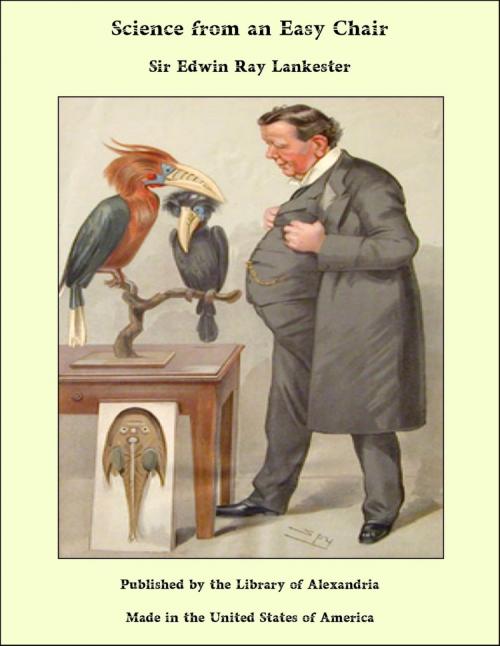Science from an Easy Chair
Nonfiction, Religion & Spirituality, New Age, History, Fiction & Literature| Author: | Sir Edwin Ray Lankester | ISBN: | 9781465621603 |
| Publisher: | Library of Alexandria | Publication: | March 8, 2015 |
| Imprint: | Language: | English |
| Author: | Sir Edwin Ray Lankester |
| ISBN: | 9781465621603 |
| Publisher: | Library of Alexandria |
| Publication: | March 8, 2015 |
| Imprint: | |
| Language: | English |
The delight which is experienced by those who discover new things in the various branches of science is, no doubt, very great. To reveal to other men processes, properties, existences in the natural world hitherto unsuspected, or, if suspected, yet eluding the grasp of man, is to do something which gives to him who does it a sense that he is of value in the world—a sense which will uphold him and enable him to endure adversity, and even persecution, with equanimity. But there is, perhaps, a greater and more vivid satisfaction for those who do or make great and splendid things which all men can see, and for which all men are grateful. The great artist—poet, painter, builder, or musician—has this satisfaction, and so also has the man who, by a combination of personal energy and clearness of intellectual vision, applies scientific knowledge to the accomplishment of great public works, and to the acquirement of that control by mankind of the natural conditions hostile to human progress which we may call, as did Lord Bacon, “the establishing of the kingdom of man.” The men who have expelled yellow fever from Cuba and Panama have not merely done a piece of sanitary cleaning up; they have first imagined and then created, by the force of human will, directed and maintained by conviction of the reality of science, a new thing—the tropics without deadly fever, the tropics as a healthy and welcome home for the white man. That is comparable to the work of a great artist in the directness of its appeal; it is in its actual detail the result of the combination of the skill of the engineer with the foresight and absolute domination of his human agents of a military genius. For this magnificent work the highest credit is due to the United States chief sanitary officer, Colonel Gorgas. It is well known how the American Medical Commission in Cuba proved six years ago that yellow fever is conveyed from man to man solely and entirely by a gnat common in Central America, known asStegomyia, and further, how by carrying out measures for preventing the entrance of these gnats into dwelling-houses, and especially by keeping them away from yellow fever patients so that they fail to obtain and carry the yellow fever germ, even if they do bite healthy men, Colonel Gorgas and his associates practically eradicated yellow fever in Cuba. The bite of the Stegomyia gnat is the only way in which a man can acquire yellow fever, and the gnat which bites him must have taken up the germs of yellow fever from another man—twelve days (no less) previously.
The delight which is experienced by those who discover new things in the various branches of science is, no doubt, very great. To reveal to other men processes, properties, existences in the natural world hitherto unsuspected, or, if suspected, yet eluding the grasp of man, is to do something which gives to him who does it a sense that he is of value in the world—a sense which will uphold him and enable him to endure adversity, and even persecution, with equanimity. But there is, perhaps, a greater and more vivid satisfaction for those who do or make great and splendid things which all men can see, and for which all men are grateful. The great artist—poet, painter, builder, or musician—has this satisfaction, and so also has the man who, by a combination of personal energy and clearness of intellectual vision, applies scientific knowledge to the accomplishment of great public works, and to the acquirement of that control by mankind of the natural conditions hostile to human progress which we may call, as did Lord Bacon, “the establishing of the kingdom of man.” The men who have expelled yellow fever from Cuba and Panama have not merely done a piece of sanitary cleaning up; they have first imagined and then created, by the force of human will, directed and maintained by conviction of the reality of science, a new thing—the tropics without deadly fever, the tropics as a healthy and welcome home for the white man. That is comparable to the work of a great artist in the directness of its appeal; it is in its actual detail the result of the combination of the skill of the engineer with the foresight and absolute domination of his human agents of a military genius. For this magnificent work the highest credit is due to the United States chief sanitary officer, Colonel Gorgas. It is well known how the American Medical Commission in Cuba proved six years ago that yellow fever is conveyed from man to man solely and entirely by a gnat common in Central America, known asStegomyia, and further, how by carrying out measures for preventing the entrance of these gnats into dwelling-houses, and especially by keeping them away from yellow fever patients so that they fail to obtain and carry the yellow fever germ, even if they do bite healthy men, Colonel Gorgas and his associates practically eradicated yellow fever in Cuba. The bite of the Stegomyia gnat is the only way in which a man can acquire yellow fever, and the gnat which bites him must have taken up the germs of yellow fever from another man—twelve days (no less) previously.















